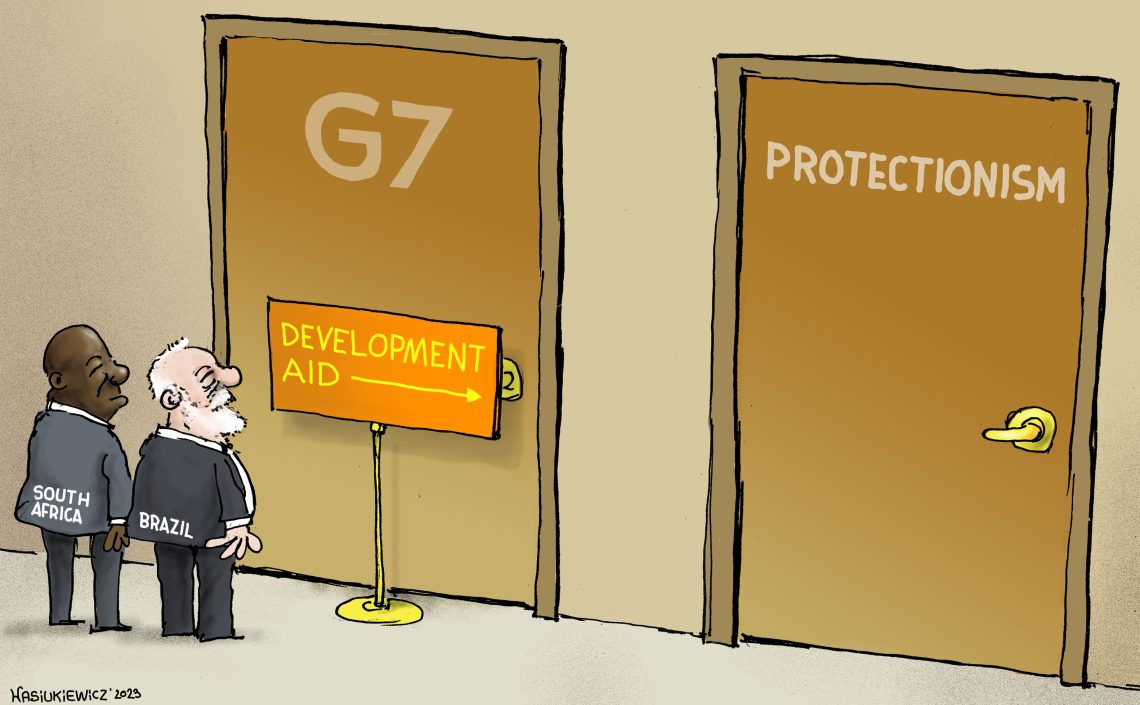The West still misunderstands the Global South
Old industrial countries’ paternalistic approach to Global South countries is wrongheaded and impractical.

The G7 summit was held last week in Hiroshima, Japan. In 1949, the Japanese parliament designated the metropolis a City of Peace due to its tragic history as the first military target of an atomic bomb. Yet despite that moniker, the discussions held there mainly focused on war and conflict.
Amid Russia’s claims that it had captured the strategically important town of Bakhmut in eastern Ukraine, the leaders of the old industrialized countries (who proclaim themselves guardians of democracy) finally formally agreed to provide fighter aircraft to Ukraine. They also committed to intensifying sanctions against Russia. Ukrainian President Volodymyr Zelenskiy was invited to participate in the discussions.
Although the leaders agreed that China presented a systemic challenge and that some kind of decoupling from it should take place, perspectives differed as to what strategies their countries should pursue. British Prime Minister Rishi Sunak called China “the greatest challenge of our age,” and expressed concerns about Beijing becoming “increasingly authoritarian at home and abroad.” The German stance was less confrontational. Chancellor Olaf Scholz advocated for the continuation of commercial relations while seeking to reduce dependence, promoting a vision of peaceful coexistence.
Wrong approach toward the Global South
Another significant topic revolved around convincing the Global South to join the West in confronting Russia and containing China’s influence in the region. The discussions mostly centered on aid packages. Leaders such as President Lula da Silva of Brazil and Prime Minister Narendra Modi of India, as well as representatives from other nations, were invited to participate in the summit.
These efforts are likely to prove futile. Most countries in the Global South do not see any benefit in entering the struggle between so-called “democratic” and “authoritarian” nations. During the Cold War era, a nonaligned movement emerged. Something similar could occur in the present context as well, but the difference now is that the Global South is substantially more developed. It has gained political, strategic and particularly demographic influence, which will continue to grow.
More by Prince Michael of Liechtenstein
How empires enter their twilight
When ‘liberal democracies’ turn against freedom
The West’s miscalculation in Africa
Clear signs of this change have emerged. Just prior to the summit, military leaders from South Africa visited Moscow. The country’s president, Cyril Ramaphosa, warmly invited Russian President Vladimir Putin to the August BRICS summit in Durban and has even offered to mediate between Russia and Ukraine. Similarly, President Lula, who has made no secret of his push for closer ties with China, also expressed his willingness to mediate. However, Kyiv has firmly rejected talks based on terms favorable to Russia. The scheduled meeting between the Brazilian leader and President Zelenskiy in Hiroshima never took place.
The group of traditionally leading industrialized countries will have to recognize that they could end up in a dual confrontation. They appear to want to uphold outdated models and Western paradigms, and at the same time they are misinterpreting the needs of the Global South in a multipolar world.
New multipolarity
That governments in Brazil and South Africa have offered to mediate a European conflict is a sign of newfound self-confidence in southern countries. Moreover, it shows how any expectation that they will shift their stance on Russia is an illusion.
The aid projects proposed reek of paternalism. The West must adopt a more realistic approach. The old ways of throwing money into development aid have failed. On the other hand, reversing systems of extensive trade protectionism could provide a huge breakthrough. Numerous African products encounter substantial obstacles in accessing the European Union market, for example.
Though European leaders have been traveling to the Global South more frequently, a substantive change in policy remains elusive. One can only hope for a comprehensive paradigm shift that replaces the prevailing Western paternalism – often perceived as arrogant dogmatism – with pragmatism. New realities and the growing demographic and economic influence of Africa, South Asia and Latin America will significantly shape the new multipolar world.

